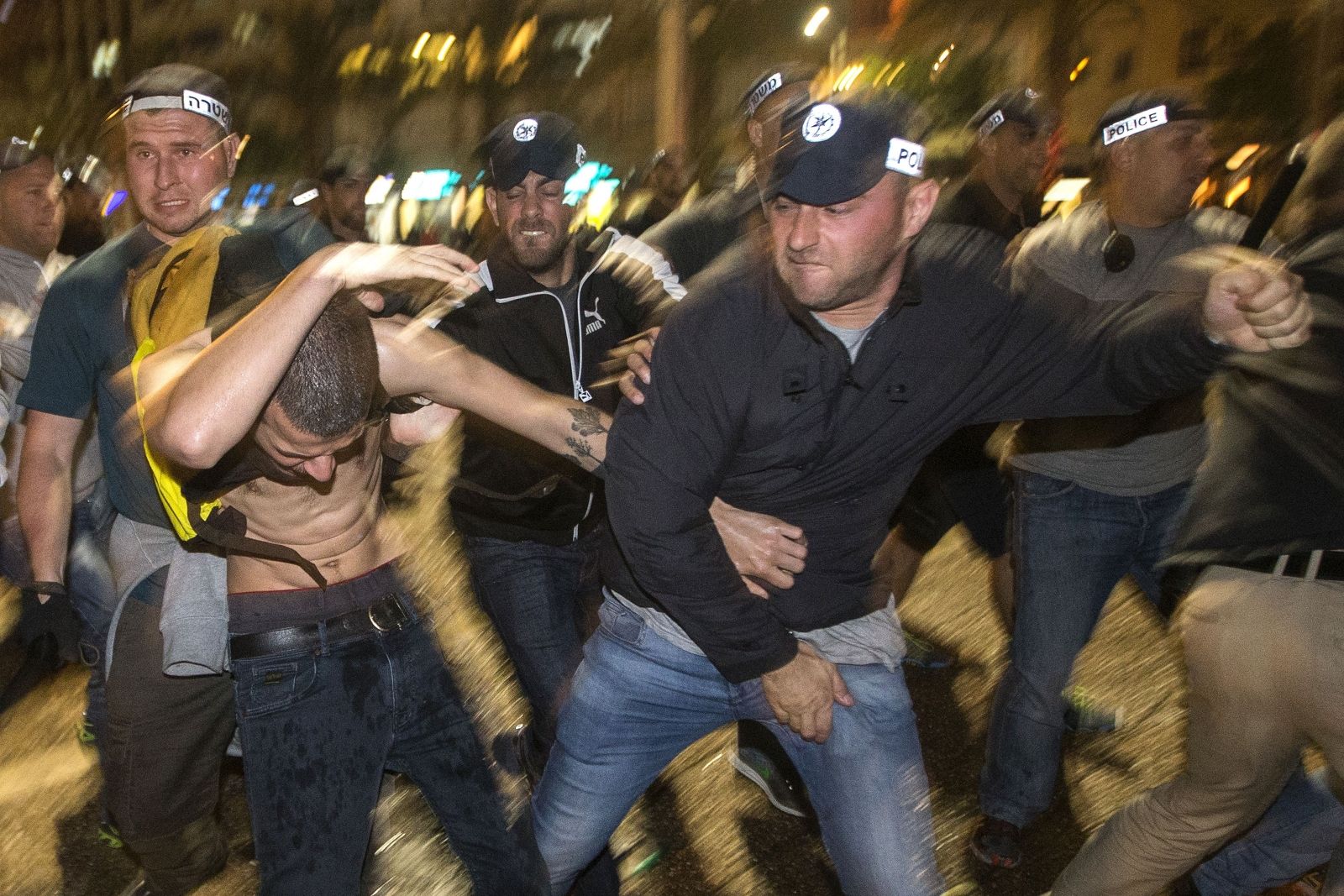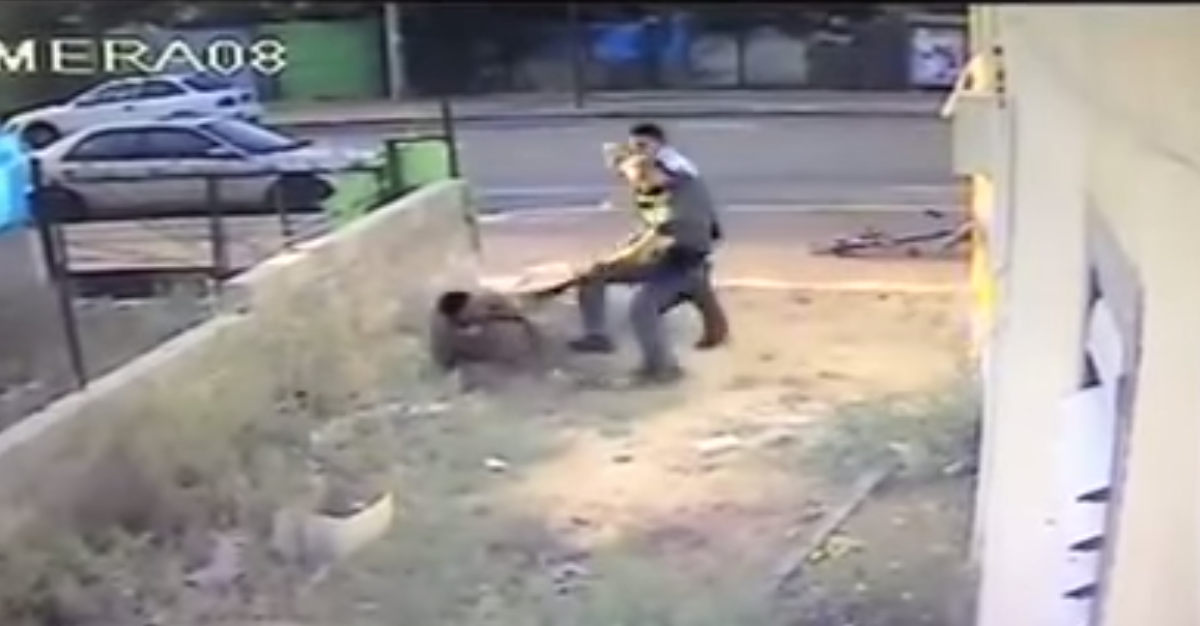
Updated | Along the white beaches of Tel Aviv, pairs of Israelis play matkot, expertly swatting rubber balls back and forth as the Mediterranean rolls gently at their feet. Even with military choppers churning through the air above, war and violence seem far away.
Yet, only a few days earlier, dozens of explosions could be heard reverberating across the city's center. Over the past three decades, Tel Aviv residents have endured Iraqi Scud missile strikes, Hamas rocket attacks and waves of Palestinian suicide bombings, but this bombardment was different. On May 3, Israeli Jews battled Israeli Jews as the country's police force cracked down on hundreds of protesters.
Around 3,000 Ethiopian-Israelis and their supporters had taken to the streets to inveigh against police discrimination after two officers were caught on camera beating a uniformed Ethiopian-Israeli soldier, Damas Pakedeh, seemingly without provocation. The assault came almost one year after Yosef Salamseh, an Ethiopian Jew, was beaten and shot by taser by the police, then left unconscious with his hands tied. He died six weeks later in what police claim was a suicide, but his parents have demanded a fresh investigation into his death.

The marchers remained peaceful until nightfall, when the two sides clashed in Rabin Square. Baton-wielding officers on horseback charged at the activists, and the police used water cannons. "The police started to act crazy—they came with all their horses, and they started to beat people," says Kasa Getoo, an activist who joined the demonstration with her mother and siblings. "After the smoke grenades, I couldn't breathe. I called my mother and told her it was time to leave, it was too dangerous."
More than 50 police officers and dozens of demonstrators were injured in the riots that ensued, stunning the Israeli public and sparking a widespread debate about the need to address a growing sense of frustration among Ethiopian-Israelis. The government denies Israel has an institutional racism problem, yet after Prime Minister Benjamin Netanyahu met with Pakedeh, the young soldier, his newly formed government pledged to address the protesters' grievances. Netanyahu's first move was to instruct Israel's Ministry of Immigrant Absorption to prepare a comprehensive proposal for greater integration of the Ethiopian Jewish community into Israeli society.
But activists balk at the idea of more integration programs. Getoo was only 3 when the Israeli government airlifted her, and more than 14,000 other Ethiopian Jews, from Addis Ababa in 1991. With Ethiopia's Marxist government about to fall after a bitter civil war, Israel organized an enormous evacuation, negotiated by President George H.W. Bush. More than 30 military and civilian aircraft flew 40 flights in a 36-hour covert mission known as Operation Solomon.
Taking almost the entire Jewish community out of Ethiopia, the new mission effectively completed Operation Moses, an earlier joint Israeli and CIA operation that airlifted 8,000 Ethiopian Jews from Sudan at the height of the Ethiopian famine in the mid-1980s. Diplomatic pressure from Sudan's Arab allies had put an end to those flights before they could finish the evacuation. Thousands of Ethiopians died trying to make the journey to the Sudanese refugee camps in the 1980s and again to Addis Ababa in 1991.
The exodus of Ethiopian Jews was celebrated by many in Israel, but not all. Swaths of the religious community continue to debate whether the Ethiopian Beta Israel sect, which practices an early form of Judaism, are truly Jewish, and since their arrival, Ethiopian-Israelis have suffered from discrimination. There have been scandals about their blood donations being dumped and allegations that women were targeted for long-term birth control injections to keep down the number of black Israelis. Assimilation programs have stripped the community of aspects of their cultural identity—even changing Ethiopian names to Jewish ones—while separating them from the rest of Israeli society.
Today the government counts around 136,000 Ethiopian-Israelis living in the country, about 2 percent of the population. Just under half were born in Israel. While the first generation focused on integration, their children want to embrace their dual heritage and end their treatment as immigrants. "When my parents came they said we were not Jewish enough; now they say we are not Israeli enough," explains Getoo. "But before we came here there was a whole history, a whole life, and I don't agree to delete it."
Long-term frustrations have been exacerbated with the recent arrival of new, non-Jewish refugees and migrants from Africa. Police lump Ethiopian-Israelis with other Africans and increasingly target them on patrols. "What's at the bottom of all of this is deeply ingrained racism in Israel," says Adi Drori-Avraham, Amnesty International Israel's refugee and migrants researcher. "There's a hierarchy of racism, in which people of Ethiopian origin are only slightly higher up than recent African refugees—because they're Jews."
Ethiopian-Israelis argue that this hierarchy keeps them out of the best jobs and forced to live in the poorest areas. While some have overcome discrimination and risen to prominence in Israeli society, a 2012 study by the Myers-JDC-Brookdale Institute revealed that 41 percent of the community lives below the poverty line, with the average income of Ethiopian-Israelis a third less than that of the overall Jewish population.
Parliamentarian Pnina Tamano-Shata is one of those who has triumphed in the face of adversity. She came to Israel when she was 3, during Operation Moses, and is the only Ethiopian-Israeli elected to the Knesset. "People sometimes think because you are black you are of less value, if you are black you don't have a mind," she says. "But it doesn't bother me when someone calls me a Negro. What bothers me is when the government makes decisions for us."
Tamano-Shata took part in the May 3 protest but is now calling for patience from Ethiopian-Israelis. She believes the government has heard her community's frustration and wants to address the problem.
So for now, it seems, Tel Aviv residents can enjoy a period of relative calm. But should government officials fail to deliver on their promises, the next sounds they hear may be far more disturbing than the staccato pinging of rubber balls along the beach.
Uncommon Knowledge
Newsweek is committed to challenging conventional wisdom and finding connections in the search for common ground.
Newsweek is committed to challenging conventional wisdom and finding connections in the search for common ground.
About the writer
Maxim Tucker is a Ukraine-based journalist reporting for Newsweek, The Times and the BBC. The former news editor of the Kyiv Post, he previously worked ... Read more
To read how Newsweek uses AI as a newsroom tool, Click here.








